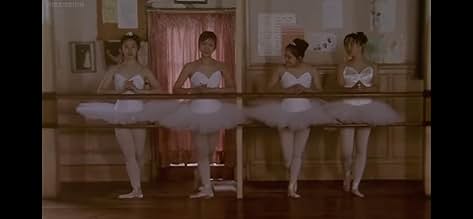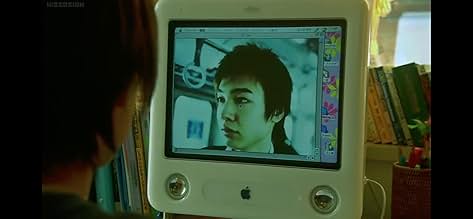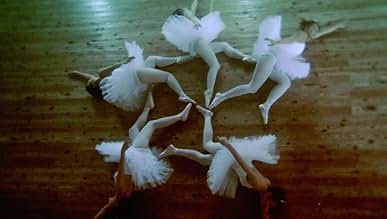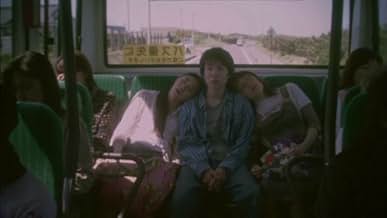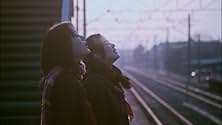IMDb RATING
7.2/10
5.1K
YOUR RATING
When two best friends develop a crush on the same boy, they develop a plan to trick him into dating them.When two best friends develop a crush on the same boy, they develop a plan to trick him into dating them.When two best friends develop a crush on the same boy, they develop a plan to trick him into dating them.
- Awards
- 1 win total
- Director
- Writer
- All cast & crew
- Production, box office & more at IMDbPro
Storyline
Did you know
- TriviaAlthough released almost 11 years before The Murder Case of Hana & Alice (2015), this movie actually serves as the sequel.
- Quotes
Setsuko "Alice" Arisugawa: I saw 'Hannibal' on satellite last night.
Hana: So did I.
Setsuko "Alice" Arisugawa: I was scared.
Hana: Isn't he creepy?
Setsuko "Alice" Arisugawa: Yeah. Don't you think real people are scarier... than zombies and ghosts?
- ConnectionsFeatures Horus: Prince of the Sun (1968)
Featured review
The base layer here is teenage romance tweaked a little to frame episodes of ordinary life. Two schoolgirls fall in love with an aloof boy who believes he suffers from amnesia.
Annotating this is Celine and Julie Go Boating, which was about two girls embarking upon dreamlike adventure and mischief around modern Paris. What was so remarkable about it were precisely the elusive controls: the film didn't give out that we were, in fact, daydreaming until we were too far in to know exactly where. The clue was already laid out in the first scene, a cat of mysterious eyes and a peculiar chase through empty streets.
So you will have to pay attention to the opening scenes of Iwai's film, echoing this. Once again a chase in and out of subway cars as giggly play between the two girls. The other clue is obvious enough: Alice.
This layer borrows Rivette's whimsical light structure. Roles, guises, fiction, synchronous games about the fabrication of narratives, in our case centered at this boy who remembers nothing, is empty space, a blank stage, and the plays the girls assemble around him. He's told he was in love with one, then both. They both act parts, fashion entire pasts and emotions.
So love as this game of fiction, and getting to allow to be seduced by an image. This is excellent work, and in how it's subtly acknowledged inside the film: one girl signs up for a drama class, and has in fact done so to be close to the boy, himself an actor, the other is randomly approached on the street to model for TV commercials - and this may well reference Mikio Naruse's wonderful Street without Return from '34.
So the third layer is how the play is going to be resolved on a level behind the base narrative of ordinary life, and into the stage where love is the heightened game of duplicity.
One ploy is simple enough, opening day for the school play both girl and boy were rehearsing and a near-perfect rendition of the mechanisms that give rise to images: out on the stage performance, roles, fiction consumed as real, and backstage the internal machinations of tortured soul. The other is a little more intricate because of how unassuming: Alice auditions for a part in TV commercial.
Now so far this is no different than a French film. Notice what Iwai does, an extra layer that is deeply Japanese. Now the Japanese idea of high beauty and by extension performance, what is often perceived as quaint reticence, is formless heart expressed in visible form. Meditation.
But even a patriarch of Chan like Hongren could not so simply gauge his pupils' inner heart when the time came to decide for a succesor. What he asked instead, was that they write poems on a wall about it. This is a frequent practice in Buddhism. Painting a cycle will do, an 'ensho' meaning awareness. The hand will tell.
Now all through the film Hana has secretly contrived to cling to her object of desire, has lied and deceived. But when it comes to expressing inner self, we note that she is, in fact, a bad actress. Iwai intercuts her melodramatic reactions backstage with the actor's mock-mannerisms out on the stage. The auditorium is empty when she finally gets out for her part.
On the other hand Alice. She has been part of the ploy but with a certain affection for the part and with genuine feelings. So much so that it slipped from her, a bad actress in terms of the conventional drama of the world. We trust however that even though the image is false, she's moved to it truthfully. Her audition is to play an image on a screen. Instead the director decides on a whim that he wants her to do a ballet dance as per her resume, and in a short skirt, an almost humiliating prospect. What does she do? Channeling true self into the thing, she amazes with her skills.
So what do we get, between these two girls? Flowers in the sky, Hana meaning flower, reflecting Zen Master Dogen's notions of illusory mind images.
And on the other hand, the subtlest difference. Emptiness in full bloom. Or in the words of Dogen: being one with just this, while being free from just this.
Something to meditate upon.
Annotating this is Celine and Julie Go Boating, which was about two girls embarking upon dreamlike adventure and mischief around modern Paris. What was so remarkable about it were precisely the elusive controls: the film didn't give out that we were, in fact, daydreaming until we were too far in to know exactly where. The clue was already laid out in the first scene, a cat of mysterious eyes and a peculiar chase through empty streets.
So you will have to pay attention to the opening scenes of Iwai's film, echoing this. Once again a chase in and out of subway cars as giggly play between the two girls. The other clue is obvious enough: Alice.
This layer borrows Rivette's whimsical light structure. Roles, guises, fiction, synchronous games about the fabrication of narratives, in our case centered at this boy who remembers nothing, is empty space, a blank stage, and the plays the girls assemble around him. He's told he was in love with one, then both. They both act parts, fashion entire pasts and emotions.
So love as this game of fiction, and getting to allow to be seduced by an image. This is excellent work, and in how it's subtly acknowledged inside the film: one girl signs up for a drama class, and has in fact done so to be close to the boy, himself an actor, the other is randomly approached on the street to model for TV commercials - and this may well reference Mikio Naruse's wonderful Street without Return from '34.
So the third layer is how the play is going to be resolved on a level behind the base narrative of ordinary life, and into the stage where love is the heightened game of duplicity.
One ploy is simple enough, opening day for the school play both girl and boy were rehearsing and a near-perfect rendition of the mechanisms that give rise to images: out on the stage performance, roles, fiction consumed as real, and backstage the internal machinations of tortured soul. The other is a little more intricate because of how unassuming: Alice auditions for a part in TV commercial.
Now so far this is no different than a French film. Notice what Iwai does, an extra layer that is deeply Japanese. Now the Japanese idea of high beauty and by extension performance, what is often perceived as quaint reticence, is formless heart expressed in visible form. Meditation.
But even a patriarch of Chan like Hongren could not so simply gauge his pupils' inner heart when the time came to decide for a succesor. What he asked instead, was that they write poems on a wall about it. This is a frequent practice in Buddhism. Painting a cycle will do, an 'ensho' meaning awareness. The hand will tell.
Now all through the film Hana has secretly contrived to cling to her object of desire, has lied and deceived. But when it comes to expressing inner self, we note that she is, in fact, a bad actress. Iwai intercuts her melodramatic reactions backstage with the actor's mock-mannerisms out on the stage. The auditorium is empty when she finally gets out for her part.
On the other hand Alice. She has been part of the ploy but with a certain affection for the part and with genuine feelings. So much so that it slipped from her, a bad actress in terms of the conventional drama of the world. We trust however that even though the image is false, she's moved to it truthfully. Her audition is to play an image on a screen. Instead the director decides on a whim that he wants her to do a ballet dance as per her resume, and in a short skirt, an almost humiliating prospect. What does she do? Channeling true self into the thing, she amazes with her skills.
So what do we get, between these two girls? Flowers in the sky, Hana meaning flower, reflecting Zen Master Dogen's notions of illusory mind images.
And on the other hand, the subtlest difference. Emptiness in full bloom. Or in the words of Dogen: being one with just this, while being free from just this.
Something to meditate upon.
- chaos-rampant
- Mar 3, 2012
- Permalink
- How long is Hana and Alice?Powered by Alexa
Details
Box office
- Gross worldwide
- $654,448
Contribute to this page
Suggest an edit or add missing content


